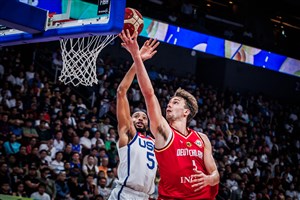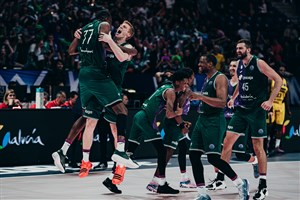
Stern helped form a bond between the NBA and FIBA that shaped the global basketball landscape
VALENCIA (Jeff Taylor's Eurovision) - David Stern was a colossus in the world of basketball. Everyone knows he made the game better with his leadership, savvy, hard work and ingenuity. A lot better.
His enthusiasm and intelligence were off the charts. If Stern didn't soar high above the floor for dunks like Michael Jordan, wow fans with fast breaks like Magic Johnson or make clutch three-pointers like Larry Bird, he was every bit as important as any legend when it came to growth of the game.
Stern, who passed away on January 1 at the age of 77, was the ultimate mover and shaker. He was a power broker. He was a visionary.
A lawyer by trade, Stern usually got what he wanted and that was good for basketball because when he became NBA commissioner in 1984, the league took off. Capitalizing on the excellence of Jordan, Magic and Bird, Stern was the consummate businessman. He took the league, and the sport, to unprecedented heights.
"(STERN) GREW THE LEAGUE INTO AN INTERNATIONAL PHENOMENON, CREATING OPPORTUNITIES THAT FEW COULD HAVE IMAGINED BEFORE. HIS VISION AND LEADERSHIP PROVIDED ME WITH THE GLOBAL STAGE THAT ALLOWED ME TO SUCCEED."
Stern's efforts helped grow a worldwide audience and increased the financial coffers of the league, the owners and the players.
Jordan emphasized that point when he released a statement following Stern's death, saying he "grew the league into an international phenomenon, creating opportunities that few could have imagined before. His vision and leadership provided me with the global stage that allowed me to succeed. [...] I wouldn't be where I am without him."
His impact on international basketball was undeniable. Stern had a solid and productive relationship with FIBA that began just months into his role as commissioner when he made contact with then FIBA Secretary General Borislav Stankovic at a basketball convention in Milan, Italy.
The pair wanted basketball to be more unified. They wanted the NBA's best teams to compete against other league champions. They also shared the belief that professional players should be allowed to compete at the Olympics. Such an event would have a massive impact on the game, each believed.
David Stern (Milwaukee. Open McDonald´s 1987) pic.twitter.com/RUGZaD7k
— Alberto Escalante (@aescalante_) October 25, 2012
Over the next several years, major steps were taken that changed the game forever. The first McDonald's Open was staged in Milwaukee, in 1987, and it involved the Milwaukee Bucks, the reigning European club champions Olimpia Milano and the European national team powerhouse, the Soviet Union. The Bucks beat both teams from overseas and won the event that was televised in America on ABC TV.
Lithuanian Sarunas Marciulionis and Ukrainian Alexander Volkov represented that Soviet Union team and two years later were in the NBA with Golden State and Atlanta, respectively.
In 1988, the second McDonald's Open was staged in Madrid, Spain, only this time with four teams: the Boston Celtics, Scavolini Pesaro, the Yugoslavia national team and hosts Real Madrid.
 Jordan and the Chicago Bulls were the star attraction at the 1997 McDonald's Championship in Paris
Jordan and the Chicago Bulls were the star attraction at the 1997 McDonald's Championship in Paris
If a cross-Atlantic trip for a tournament before an NBA season wasn't embraced by NBA players, Stern insisted they go, knowing Bird, Robert Parish, Kevin McHale and Dennis Johnson would boost the event. The Celtics won the competition. Seven more McDonald's Championships, as it was renamed, were held, the last in 1999, in Milan.
As for the professionals at the Olympics, FIBA opened the door to their participation in 1989 when the FIBA Congress dropped the word "Amateur" from its name and the Fédération Internationale de Basketball Amateur became the Fédération Internationale de Basketball.
Then in 1992, NBA players competed at an Olympics for the first time. A USA Dream Team that had Jordan, Magic, Bird and nine other superstars took Barcelona by storm and won the gold medal.
Other countries with NBA players were Lithuania (Marciulionis and Arvydas Sabonis), Croatia (Drazen Petrovic) and Germany (Detlef Schrempf).
The high-flying, supremely talented USA players fueled interest in the sport like never before. Stern said in a 2014 interview with the New York Times that the USA NBA players' presence in Barcelona was one of his most cherished on-court memories because of "what the Dream Team represented, this much-maligned group of players and sport, on the march to the gold medal stand, being feted like a combination of the Bolshoi, the Philharmonic and the Beatles...
"And therein launched the globalization of the game."
Future NBA and international superstars like Dirk Nowitzki, Manu Ginobili, Tony Parker and Pau Gasol had seen those Barcelona Games and were inspired by the Dream Team.
 FIBA dropped the word Amateur from its name in 1989 and enacted rules which allowed pros to play at the Barcelona Games
FIBA dropped the word Amateur from its name in 1989 and enacted rules which allowed pros to play at the Barcelona Games
Marciulionis, who was inducted into the Naismith Memorial Basketball Hall of Fame in 2014, said of Stern on Lithuanian media outlet lrytas.lt: "He came to Vilnius, Tbilisi and Moscow with the Atlanta Hawks in 1987. That was the first time I met him and had a chance to talk with him, to the extent we could understand each other of course. Already in '87 he was laying the foundation for basketball as an international sport, understanding the need to get players from the Eastern Bloc on the market.
"I don't think there's ever been a more influential person in basketball who has made such progress. And it's not necessarily the sporting aspect. He had a vision from a commercial standpoint, he had a lot of ties and knew how to make basketball a product, a show, partially even art, and not just a sport."
FIBA further cemented its ties with the NBA in 2014 when the sport's world governing body provided a specific position for the NBA on the FIBA Central Board, the top decision-making body.
That's important for many reasons, including the fact that all NBA teams have or have had international players, and since 1992 every Olympics and FIBA Basketball Word Cup (except for the 1998 edition affected by the NBA lockout) has NBA players.
Today the #NBAFamily lost a legend, a leader that changed our game for the better. A father, a husband, a friend.
— Pau Gasol (@paugasol) January 1, 2020
RIP #DavidStern, you will forever be missed. 🙏🏼 pic.twitter.com/0dColRyTOT
The bond between FIBA and the NBA is stronger than ever. There were a record 54 NBA players from 17 different countries at the FIBA Basketball World Cup staged in China last year.
Rest In Peace #DavidStern 🙏🏻
— Tony Parker (@tonyparker) January 1, 2020
You will be missed immensely. #NBAfamily #grateful pic.twitter.com/aj66UALo1J
The FIBA-NBA partnership initiated by Stern and Stankovic continues to bear fruit in different ways: from the cooperation with youth programs to club competitions and beyond.
The two joined forces together to launch the Basketball Africa League, which was announced last year and tips off this March with 12 teams divided into two conferences. This is the NBA's first collaboration to operate a league outside of North America.
FIBA and the NBA have worked together since 2001 staging the global development program, Basketball Without Borders.
The collaboration in officiating and rule matters has also deepened, with mutual exchanges in FIBA tournaments and the NBA Summer League.
The NBA agreed to the NBA G-League Champion taking part in the FIBA Intercontinental Cup. The Austin Spurs were the first team to do this last February in Rio de Janeiro while Rio Grande Valley Vipers will play at the FIBA Intercontinental Cup 2020 next month in Tenerife.
FIBA and the NBA also announced last June a new collaboration in relation to the Jr NBA program, a global grassroots initiative in conjunction with coaching and referee clinics.
It's a sad time for the death of Stern, yet it's also a good time to remember just how influential he has been in making the game what it is today.
Jeff Taylor
FIBA
















